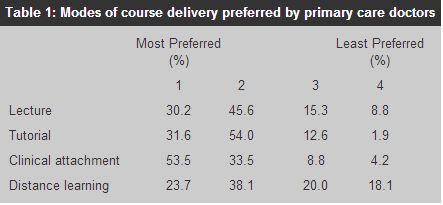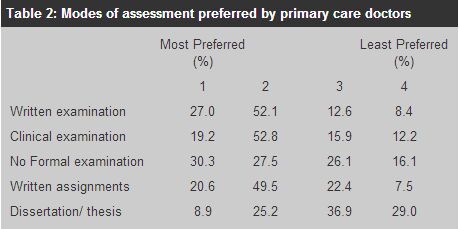
|
October 2007, Volume 29, No. 10
|
Letter to the Editor
|
The preferred mode of teaching and examination of primary care doctors undertaking postgraduate diploma studies in Hong KongT P Lam 林大邦, K F Lam 林國輝, E Y Y Tse 謝婉儀 A key activity for doctors is lifelong learning. In Hong Kong, many primary care doctors undertake postgraduate diploma studies to upskill themselves. In 2004, we surveyed 317 doctosrs who had applied to undertake postgraduate diploma studies at the Family Medicine Unit, The University of Hong Kong and 216 responded, with a response rate of 68.1%.1 The respondents' preferences of modes of course delivery are detailed in Table 1. Clinical attachments and tutorials were preferred to lectures and distance learning. Ordinal logistic regression analyses showed that respondents with more clinical experience considered 'lecture' (p=0.029), 'tutorial' (p=0.022) and 'clinical attachment' (p<0.001) more preferable than the respondents with less clinical experience who were however more likely to prefer distance learning than their senior counterparts (p=0.039). Senior members of the College considered 'clinical attachment' (p<0.001) more preferable than the junior members. Dissertation/thesis writing was the least preferred mode of assessment (Table 2) by the respondents whereas written examination or clinical examination was preferred by more respondents. Ordinal logistic regression analyses showed that doctors in private practice were more likely to prefer clinical examinations than their public counterparts (p=0.001). Similar finding was noted among doctors with more clinical experience (p=0.046) and senior members of the College (p=0.037) when compared to doctors with less clinical experience and junior members of the College respectively. It is also interesting to note that 57.8% of respondents had stronger preference for no formal examination at all! This may reflect the heavy examination pressure that the primary care doctors may experience during their postgraduate studies.
It is not surprising to find that clinical attachments and tutorials were preferred. These are small groups (up to six students in each group) and are clinically orientated. The longer working hours of the junior doctors may explain their preference towards distance learning. Many of them may not have their own cars to travel to the site for clinical teaching as to keep a car is expensive in a city like Hong Kong. Research skills are something that most primary care doctors would feel very inadequate. This may explain why dissertation/thesis writing is the least preferred assessment mode. However, primary care medicine is probably the least understood segment of all branches of clinical medicine and the implication is that much more work would be needed to promote primary care research.
T P Lam, PhD, MD, FRACGP, FHKAM (Fam Med)
Family Medicine Unit, Department of Medicine K F Lam, PhD Department of Statistics and Actuarial Science E Y Y Tse, FRCGP, FHKAM (Fam Med) Family Medicine Unit, Department of Medicine, The University of Hong Kong. Correspondence to : Dr Yvonne Lo, Family Medicine Unit, 3/F, Ap Lei Chau Clinic, 161 Main Street, Ap Lei Chau, Hong Kong.
References
|
|

